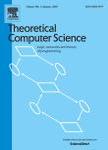版权所有:内蒙古大学图书馆 技术提供:维普资讯• 智图
内蒙古自治区呼和浩特市赛罕区大学西街235号 邮编: 010021

作者机构:Kyoto Univ Grad Sch Informat Kyoto 6068501 Japan Tech Univ Dresden Dept Comp Sci D-01062 Dresden Germany
出 版 物:《THEORETICAL COMPUTER SCIENCE》 (理论计算机科学)
年 卷 期:2006年第350卷第1期
页 面:140-162页
核心收录:
学科分类:08[工学] 0812[工学-计算机科学与技术(可授工学、理学学位)]
基 金:Ministry of Education Culture Sports Science and Technology MEXT
主 题:hypothesis finding connection method relevance logic residue hypotheses inductive logic abduction and knowledge discovery
摘 要:For two given formulae B and C with B does not satisfy C, hypothesis finding means to produce a formula S such that B boolean AND S satisfies C. Hypothesis finding, or variants thereof, is central to various types of inference, e.g., abductive inference, inductive inference, machine learning, and machine discovery. Clarifying the nature of hypothesis finding is still in its infancy, a situation similar to the establishment of logical foundations of inference related to induction and discovery. Although trivial solutions to hypothesis finding are easy to give, finding appropriate hypotheses still remains as a great challenge. A central role in this context plays the question, what it means for a hypothesis to be appropriate? In this paper we propose an answer to this question, which is based on proof theoretical criteria. This is in contrast to most previous approaches where appropriateness of hypotheses was based on concepts of semantical weakness in classical logic. More precisely, we use provability in Relevance Logic instead of classical semantical entailment, we demand utmost exploitation of the inferential potential (deductive content) inherent in B - C and we demand S to be a minimal deductive supplement to B - C. Along these lines we developed the concept of a minimized residue hypothesis which also constitutes an interesting trade-off between logical smallness and syntactical smallness . Published by Elsevier B.V.